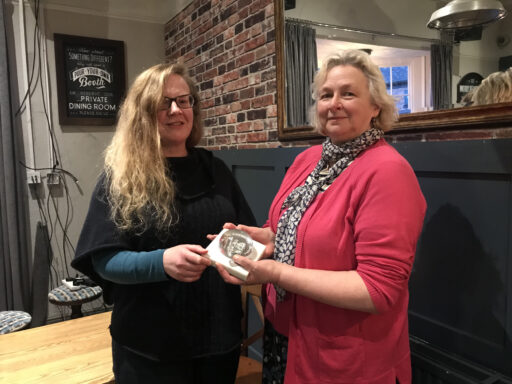
This competition is always, as the name would suggest, for writing with an historical theme and this year it was the turn of fiction.
Our adjudicator, Suzanne Stirke, began by explaining that, when first drawn to pick up her pen, she had gone on a short writing course at Darlington 6th Form College. From there, she was encouraged to do a University Master’s course in Creative Writing as a mature student. Since then she has written and self-published two books set around Bedale, one about a particular building set in the early 1800s and the other about the resolution of a mystery surrounding that building set in modern times. She is now working on a third book about a local woman called Dorothy Patterson.
Suzanne went on to say what she was looking for in a short story:
- A beginning, middle and an end
- Must be concise
- No irrelevant detail (in a short story)
- Assume that the reader knows nothing
- Either 3rd person or 1st person narrative (she didn’t mention the rarer 2nd person narrative form)
- Not too many characters
- A good ending.
Turning to the seven entries Suzanne then made her comments on each. The entries were:
- ‘A Bedtime Story’ – Lotte Wilson – a grandfather tells two young boys a bedtime story based on his own memories
- ‘Departure and Arrival’ – Joe Peters – a young woman begins to travel the world
- ‘Great Aunt Tillie’ – Sheila Whitfield – June is sorting out belongings after the death of her husband
- ‘Private Tom Brownlea’ – Charles Lubelski – a story about a reluctant recruit in the First World War
- ‘The Big Decision’ – Peter Page – a young Irishman from the Dingle Peninsula decides to emigrate to America around 1900
- ‘The Fine Aroma of Coffee’ – Maggie Cobbett – a ghost story set in the York Castle Museum
- ‘The Star of the Sea’ – Susan Perkins – a story about a haunted pub beside the sea in Northern England.
Suzanne then announced the winners as follows
- Joint Second – Peter Page with ‘The Big Decision’ and Maggie Cobbett with ‘The Fine Aroma of Coffee’
- First – Lotte Wilson with ‘A Bedtime Story’
Suzanne presented Lotte with the trophy.
After the break, the remaining entries were paired with their authors and accompanied by discussion before Susan invited Lotte and Peter to read their stories.
Suzanne had brought along copies of both her published books for members to examine and there was just time for her to read the blurbs from the backs before the meeting closed with thanks being expressed to her for a much appreciated adjudication.
Due to circumstances beyond our control, Suzanne Stirke’s adjudication of the ‘Blast from the Past’ competition will now take place on Wednesday, 17th April.
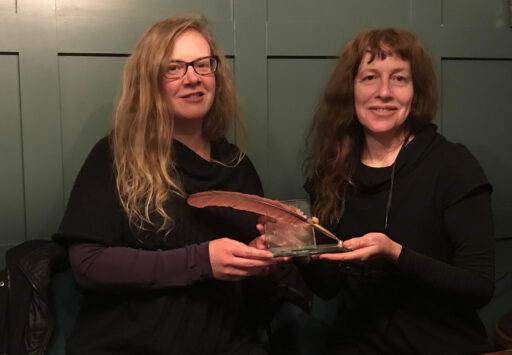
We welcomed Mary-Jane Holmes as our adjudicator this year. She had obviously put a great deal of thought into the task and did a very thorough job. Before announcing her decision, she read out each of the poems submitted and gave a detailed critique. A written version was also attached to each entry for the poet to peruse at leisure later on.
Charlotte Wilson (pictured above receiving the trophy from Mary-Jane) came first with ‘Pond Life’. Sheila Whitfield was in second place with ‘Inland Dreams’ and Kate Swann came third with ‘On the Scales for Grandad’. Mary-Jane congratulated everyone who had entered the competition. With a high standard overall, the great variety of themes and styles had made choosing the winners difficult.
After the adjudication, Mary-Jane answered questions about her own work and poetry in general.
From her bio: Mary-Jane Holmes wanders and writes in the wilds of Upper Teesdale. She has garnered many awards including winning the Bridport Poetry prize, the Writer’s Digest poetry competition, the Live Canon Poetry Pamphlet Prize, Bath Novella-in-Flash Prize, , Martin Starkie, Dromineer, Reflex Fiction and Mslexia Flash prize as well as the Bedford Poetry competition. She has been shortlisted for the Beverley International Prize for Literature and longlisted for the UK National Poetry Prize twice. Mary-Jane’s poetry collection Heliotrope with Matches and Magnifying Glass is published by Pindrop Press. Her pamphlet Dihedral is published by Live Canon Press and her novella Don’t Tell the Bees, is published by AdHoc Fiction. Her Lockdown poem ‘Letter from Baldersdale’ joins 20 other poems in the National Poetry Archive on their 20th anniversary. Her collection of Flash Fiction was published by V press in 2021 and was shortlisted for the Eyelands Literary prize in 2023.
Her work appears in a variety of publications including Aesthetica. Magma, Modern Poetry in Translation, Mslexia, The Lonely Crowd, Prole The Journal of Compressed Creative Arts, and in anthologies including Best Small Fictions 2014/16/18/20 and Best Microfictions 2020.
She has an MA (Distinction) in Creative Writing from Kellogg College, Oxford and has been awarded an Arts and Humanities Research Council studentship to complete a PhD in poetry and translation at Newcastle University. UK.
New Collection of Short Fiction: Set a Crow to Catch a Crow
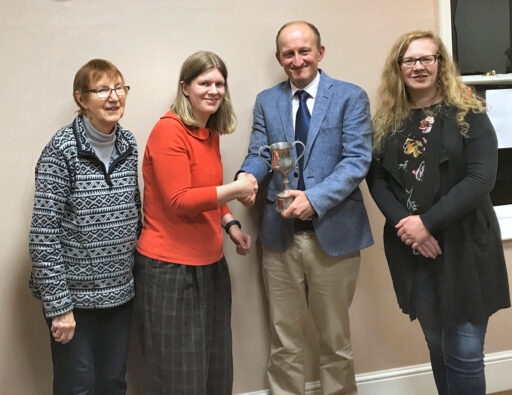
Bill Hilton began by saying how much he had enjoyed reading all the entries, (which had not always been his experience as an adjudicator) and was then invited to describe his personal connections with writing as a profession. After studying for a degree in English and Music, he taught English for 6 years before starting his own business as a professional advertising copywriter for large firms. That led to branching out into training courses in writing for big businesses, so that they would be able to produce their own copy. After going back to university to do an M.A. in English, Bill turned his focus onto producing piano books and tutorials for YouTube.
When considering a piece of writing, Bill looks for the following:
1) Would he like to read more by this author?
2) Does the author display confidence in him//herself and the reader/audience?
3) Does the writing exhibit control of the structure of the piece, both overall and at sentence level?
4) An interesting subject and, particularly, an interesting title.
In random order, the entries for the competition were:
‘Family History’ by Joe Peters
‘Buried Treasure: Sutton Hoo’ by Charlotte Wilson
‘Oppenheimer: The film’ by Susan Perkins
‘In the British Museum’ by Solvig Choi
‘There is nothing like a Dame’ by Maggie Cobbett
‘Kynista’s victory at Olympia: the case of the missing statues’ by Carol Mayer
‘Deal and ideals in art’ by Sheila Whitfield
‘Next time in Venice’ by Chrissie Russell’
The photo above shows Bill Hilton presenting the cup to Solvig Choi, who had only just handed it back in after her win the last time this competition came around. Carol Mayer and Charlotte Wilson tied for second place.
Well done everyone who took part!
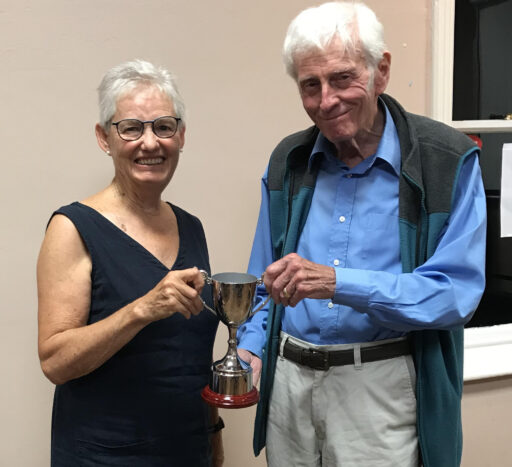
Joe Peters took great pleasure in presenting the new ‘Writing for Children’ trophy to Ros Swaney. The competition was inaugurated in honour of Joe’s late wife Daphne, the founder of Ripon Writers’ Group, and you can find an account of the adjudication by Claire Thompson by scrolling back to mid-July.
Competitions Secretary Susan Perkins reminded us that Claire had awarded ‘Dusty the Cupboard Monster’ first place as the story most likely in her experience to be chosen by children visiting the library. An accolade indeed!
Yesterday evening saw the Group, set up over 40 years ago by the late and still very much missed Daphne Peters, reach a new milestone.
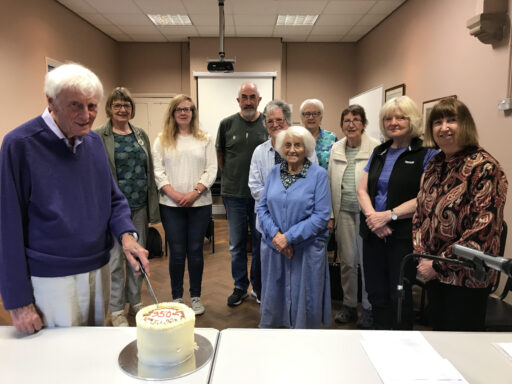
Several members couldn’t make it to the meeting, but those of us who did enjoyed a celebration cake made by Messy Buns of Ripon, cut by Joe Peters and accompanied by glasses of fizz. Unfortunately this was also the evening we had to bid farewell to Ian Gouge, whose tenure as Chairman has been short but very successful. We’re all sorry that Ian and his family are leaving Ripon and will do our best to build on the innovations that Ian has brought to our programme over the last few months.
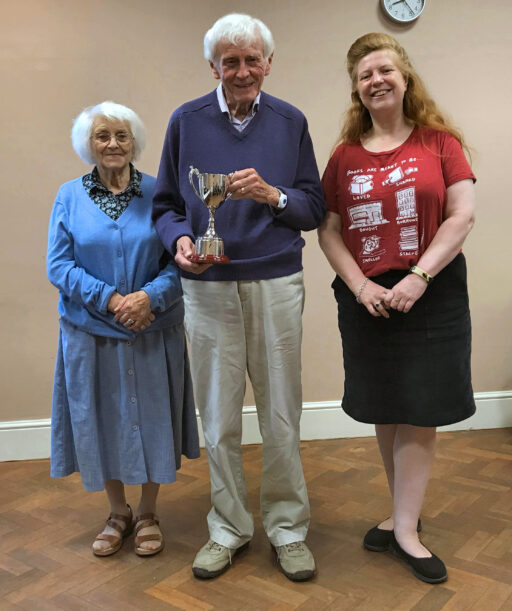
The evening also featured the results of our first ‘Writing for Children’ competition, inaugurated in memory of Daphne, well known and respected for her many published poems for children. Our adjudicator was Claire Thompson, Outreach Librarian for Ripon and Pateley Bridge, who did a very thorough job. Claire, who has also recently taken on a part-time post at Hull Library as a Festival Producer and has a special interest in children’s literature and literacy, said that she had thoroughly enjoyed reading the entries. The pieces submitted had been so diverse that it had been difficult to compare them, but the criteria that she’d used had been as follows:
- Was the target audience obvious from the piece?
- Was there a clear concept behind the writing?
- Was it original and entertaining?
- Was the message behind the piece clear?
- Zomig 2.5 mg tablets
Claire commented on each entry in random order before announcing the results.
St. Wilfrid. This was a well-researched and presented piece of non-fiction writing, with a clear purpose. Claire felt this would be worth publishing, as the information was delivered so well.
The Extraordinary Adventures of an Ordinary Boy. Well-paced, with good use of descriptive language, a clear plot and characters with scope for development.
Man of the House. This piece had a good sense of place and a good story premise. There was a lot of conversation, which Claire felt was a good tool for revealing characters quickly within the allowed word count.
Dusty the Cupboard Monster. This employed excellent descriptive language as well as alliteration. The anticipation in the story built excitement, and the layout of the text was important to the story.
Baby Wombat. This was written for a grandchild, and was very enjoyable. It contained photographs as illustrations, took a traditional format and provided a storyline with a happy ending.
Playground Rhymes. This felt like a traditional rhyme but had modern content, seeming to be a combination of a list poem and a skipping rhyme, and gave Claire plenty to think about.
Pip’s Story. This had a very strong voice coming through it, could have been a short story or a picture book and was suitable for quite a wide age range.
In third place was ‘St Wilfrid’ by Peter Page; in second place ‘Pip’s Story’ by Ella Benigno; in first place ‘Dusty the Cupboard Monster’ by Ros Swaney. Because Ros was not able to attend, it was agreed that she would be presented with the trophy, provided by Joe, at a later date. In the photo above, Joe is flanked by Ella and Claire.
Ian invited the members to join him in thanking Claire for her adjudication, especially as she had been presented with such a diverse range of material for consideration. Maggie took the opportunity to thank Ian for everything he had done for the Group and to wish him all the best for the future.
NB Until the Annual General Meeting in November, the Committee will be working as a team to carry out what remains of the current programme.
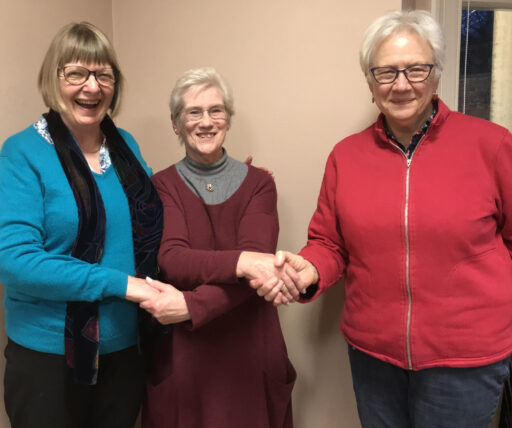
The ten entries this year were as follows:
Adding It Up by Sheila Whitfield;
Alma Road by Ian Gouge;
Feathers by Carol Mayer;
Hunter or Prey by Charlotte Wilson
Jubilate by Maggie Cobbett
One Does Have One’s Trials by Joe Peters;
Seventy Years On by Susan Perkins;
Shared With Me by Lindsay Trenholme;
The Front Door by Kate Swann
Young Girl Caught Up in a Serious Earthquake by Ella Benigno.
Anne Powell began by reminding us that the Mini-Saga competition had been launched in 1995 but, although the cup awarded for it bears the name of her late mother, Twinks Perugini Kenyon, it was based on an idea from Harry Whitton, a former member of RWG.
Anne said that she had found adjudicating ten very different mini-sagas difficult and she commended all the contributors for the high standard of work presented to her. Combining a universal theme with the ability to tell a complete story in only fifty words called for very skilfully crafted writing. Anne was fascinated to discover how she could sense something of each writer’s personality coming through their pieces and had found them all interesting or entertaining.
Because of her difficulty in being able to choose an outright winner, she awarded Joint First Place to Sheila Whitfield for ‘Adding it Up’ and Susan Perkins for ‘Seventy Years On’. Third Place went to Maggie Cobbett for ‘Jubilate’. The cup being temporarily unavailable, for which Maggie apologized, the winners received a warm handshake from Anne and she was thanked for all her hard work.
All contributing members then read their own pieces, and the mini-sagas written by those not present were read out by volunteers.
After a break for refreshments, Anne was invited to read the ‘The Lengthened Shadow of a Man is History’, the short story that won her the first prize of £1,000 in the national King Lear competition of 2020. Anne prefaced her reading by explaining that her fascination with prehistoric bog burials such as the Tollund Man had led to the story’s creation. It begins with a ‘pre-history’ which explains some of this background and leads into ‘Marjorie’s Story’. The latter narrates how a woman creating a garden in fen country digs up a prehistoric statuette, which begins to change size according to how it is kept, and how Marjorie’s subsequent demise echoes that of one of the bog people. Members commended Anne for a story that was both thought-provoking as well as atmospheric.
Older Entries »








